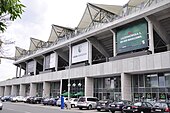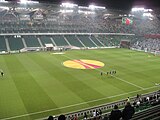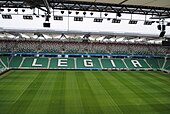Legia Warsaw: Difference between revisions
Mateusz2105 (talk | contribs) No edit summary Tags: Mobile edit Mobile web edit |
|||
| Line 9: | Line 9: | ||
| ground = [[Polish Army Stadium]] (Legia Warsaw Municipal Stadium of Marshal Józef Piłsudski ), <br> 3 Łazienkowska Street, [[Warsaw]] |
| ground = [[Polish Army Stadium]] (Legia Warsaw Municipal Stadium of Marshal Józef Piłsudski ), <br> 3 Łazienkowska Street, [[Warsaw]] |
||
| capacity = 31,103<ref>http://www.uefa.com/MultimediaFiles/Download/EuroExperience/competitions/UEFACup/01/67/58/86/1675886_DOWNLOAD.pdf</ref> | |
| capacity = 31,103<ref>http://www.uefa.com/MultimediaFiles/Download/EuroExperience/competitions/UEFACup/01/67/58/86/1675886_DOWNLOAD.pdf</ref> | |
||
| |
| chairman = {{flagicon|POL}} [[Bogusław Leśnodorski]] |
||
| manager = [[Henning Berg]] |
| manager = {{flagicon|NOR}} [[Henning Berg]] |
||
| league = [[Ekstraklasa]] |
| league = [[Ekstraklasa]] |
||
| season = [[2013–14 Ekstraklasa|2013–14]] |
| season = [[2013–14 Ekstraklasa|2013–14]] |
||
Revision as of 03:40, 17 January 2015
| File:Legia Warszawa.svg | |||
| Full name | Legia Warszawa SA | ||
|---|---|---|---|
| Nickname(s) | Wojskowi ("Militarians"), Legioniści ("Legionnaires", "Legionarries") | ||
| Founded | March 1916 as Drużyna Sportowa Legia | ||
| Ground | Polish Army Stadium (Legia Warsaw Municipal Stadium of Marshal Józef Piłsudski ), 3 Łazienkowska Street, Warsaw | ||
| Capacity | 31,103[1] | ||
| Chairman | |||
| Manager | |||
| League | Ekstraklasa | ||
| 2013–14 | 1st | ||
| Website | http://legia.com/ | ||
|
| |||
Legia Warszawa /ˈlɛɡjə/ (Polish pronunciation: [ˈlɛɡʲja varˈʂava]), known in English as Legia Warsaw, is a professional football club based in Warsaw, Poland.
It was founded in March 1916 (during military operations in World War I on the Eastern Front) in the Maniewicze area in Volhynia, as the football club of the Polish Legions. After World War I, it became the main official football club of the Polish Army – Wojskowy Klub Sportowy Legia Warszawa (Military Sports Club Legia Warsaw). From 1949 to 1957, Legia was known as CWKS Warszawa (Central Military Sports Club Warsaw).
The club's home venue is the Polish Army Stadium. Legia is one of the most successful Polish football clubs in history winning a total of 10 Ekstraklasa Champions titles,[2] a record 16 Polish Cup trophies and a record 4 Polish SuperCup matches.
Before 8 April 2004 it was owned by Pol-Mot and from 8 April 2004 (sold for 3 million złoty) up until 9 January 2014, it was owned by media conglomerate ITI Group.[3] Currently the club is owned by Dariusz Mioduski (80%) and Bogusław Leśnodorski (20%) - who serves as the club's chairman. The duo have acquired the club for unpublished sum, which also included paying off debts made by previous ownership.
History
Before World War II

Legia was formed between 5 and 15 March 1916 during military operations in World War I on the Eastern Front in the neighborhood of Maniewicze in Volhynia, as the main football club of the Polish Legions. The team had started its first training earlier in the spring of 1915, in the city of Piotrków Trybunalski. In July 1916, due to the Brusilov Offensive, Legia permanently moved to the capital city of Warsaw.
Its first game in Warsaw was played on 29 April 1917 against the local rival Polonia Warsaw. The score was a draw - 1:1. Up until the end of World War I, Legia had played nine games in Warsaw; it won six and drew three. Its first away game was against KS Cracovia, which Legia won 2:1. With the win over Cracovia, at that time the current Polish first league champion, Legia was baptized as the unofficial champion of the country.
Legia played its first match in Polish first league in Łódź on 8 May 1927 against ŁKS Łódź, winning 6:1. Marian Łańko scored the first league goal for the club (in the same game he scored a hat-trick). Since 1930, Legia has played at the Polish Army Stadium, the construction of which was a gift to the club from Józef Piłsudski. In 1936 Legia was relegated to the second division, where it remained until the end of World War II.
After World War II
After World War II, Legia boosted its squad with many new players and at the end of 1949 the club changed its name again, this time to Centralny Wojskowy Klub Sportowy (Central Army Sports Club). Eventually Kazimierz Górski joined the club and became a player for both the team and the Poland national team.
The 1970s
The 1970s were known as Poland's golden age of football. From the 1960s to the 1970s, Legia's roster included powerful football players such as Jan Tomaszewski, Kazimierz Deyna, and Robert Gadocha. In the European Cup 1969-70 Legia achieved a successful campaign by reaching the semi finals alongside Feyenoord, Leeds United, and Celtic. The following year, Legia reached the quarter finals where they lost to Atlético Madrid.
The 1980s
Though the club had many national team players including Kazimierski, Okoński, Dziekanowski, Janas, Majewski, Buncol, Kubicki, Wdowczyk and others, the club had problems winning any league titles. However, thanks to winning four Polish Cups, the team was able to compete in European competitions.
One of the more memorable European runs was the near upset against Internazionale during the UEFA Cup 1985–86, after two 0–0 games Legia lost in extra time. The next season Legia were yet again drawn against Inter, this time winning at home 3–2 but losing away 1–0 thus losing on away goals.
Legia also won its first Polish SuperCup defeating Ruch Chorzów 3–0 in 1989.
Stadium
Legia plays its games at Legia Warsaw Municipal Stadium of Marshal Józef Piłsudski (Polish: Stadion Miejski Legii Warszawa im. Marszałka Józefa Piłsudskiego), traditionally also referred to as the Polish Army Stadium (Polish: Stadion Wojska Polskiego), which is an all-seater football-specific stadium in Warsaw, Poland. Legia has been playing there since 9 August 1930. With space for 31,800 spectators it is the 5th biggest football stadium in the Ekstraklasa. The stadium underwent significant reconstruction between 2008 and 2011, during which all of the stands were demolished and replaced with bigger and more modern ones which increased the stadium's capacity from 13,500 to 31,800 seats. The former Polish Army Stadium is currently owned by the City of Warsaw.
-
Stadium exterior
-
VIP Stand
-
The eastern stand named after Kazimierz Deyna
Sponsors
| Years | Football kit | Main sponsor |
|---|---|---|
| 1978-1990 | Adidas | - |
| 1990-1991 | Umbro | Müller |
| 1991 | Lotto | Müller |
| 1992-1995 | Adidas | FSO |
| 1995-1996 | Canal + | |
| 1996-2000 | Nike | Daewoo |
| 2001 | Adidas | Daewoo |
| 2001-2002 | Pol-Mot | |
| 2002-2003 | Kredyt Bank | |
| 2003-2008 | Królewskie | |
| 2008-2010 | n | |
| 2011-2014 | ActiveJet | |
| 2014- | Fortuna |
Club partners
- Came
- Canal+
- Eurolot
- Fluminense FC
- Gatorade
- home.pl
- KS SEMP Warszawa Ursynów
- Legionovia Legionowo
- Luxmed
- Manta
- MLKS Józefovia Józefów
- PGNiG
- Sport.pl
- Ursus Warszawa
- Varsovia Warszawa
- Zagłębie Sosnowiec
Supporters
As one of the most successful clubs in Poland, Legia Warsaw is also one of its most popular clubs. Legia has gained devotion from generations of fans from Warsaw as well as around the country. Legia supporters are generally considered very spontaneous, dedicated and sometimes fanatical. Accordingly, in terms of quality of football support, they are also often described as the best supporters in Poland.[4] Groups of fans follow Legia on practically all away matches, both domestic and international. Supporters of Legia occasionally attract also some negative attention, in particular after events such as riots in Lithuania during a match against Vetra Vilnius on 10 July 2007.

Traditionally, the most devoted and spontaneous fans occupy the Żyleta stand in their stadium. Before the stadium renovation (2008–2011), the "old" Żyleta referred only to the center section within the eastern stand of the stadium (occasionally, it would also refer to eastern stand as a whole). There is a special exhibition dedicated to the "old" Żyleta in the Legia club museum.[5] Today, after the stadium's renovation, the "new" Żyleta means the whole northern stand of stadium (located behind the goal).
As regards their political sentiments, the supporters of Legia tend to be more right wing. During communism times, in particular during the 1980s, Legia fans showed their patriotic and strongly anti-communistic views. Today, the fans actively participate in annual commemorations of the Warsaw Uprising and Polish Independence Day. Legia fans are also vocal with their views on domestic issues, e.g. their conflict with Polish Prime Minister Donald Tusk, as well as on international politics, e.g. by way of displaying banners reading "Kosovo is Serbian" at the stadium. Legia Warsaw supporters maintain friendly relations with fans of Zagłębie Sosnowiec and Olimpia Elbląg. Internationally, Legia supporters maintain friendly relations with fans of ADO Den Haag and Juventus F.C.. Their main rivals include Polonia Warsaw, Lech Poznań, Wisła Kraków and Widzew Łódź.
Well known supporters include:
- Zbigniew Romaszewski
- Marek Borowski
- Zbigniew Zamachowski
- Dariusz Szpakowski
- Zygmunt Staszczyk
- Albert Sosnowski
- Tomasz Lis
- Cezary Pazura
- Jan Borysewicz
- Marcin Meller
- Janusz Zaorski
- Olaf Lubaszenko
- Kazik Staszewski
- Andrzej Gołota
- Andrzej Fonfara
- Pablopavo
Warsaw derby
The Warsaw derby is a match between Legia and Polonia Warsaw.
| Matches | Legia wins | Draws | Polonia wins |
|---|---|---|---|
| 78 | 29 | 20 | 29 |
Achievements

Domestic
- Polish championship (Ekstraklasa):
- Winners (10): 1955, 1956, 1969, 1970, 1994, 1995, 2002, 2006, 2013, 2014
- 2nd place (11): 1960, 1968, 1971, 1985, 1986, 1993,[2] 1996, 1997, 2004, 2008, 2009
- 3rd place (13): 1928, 1930, 1931, 1961, 1972, 1980, 1988, 1999, 2001, 2005, 2007, 2011, 2012
- Polish Cup:
- Winners (16-record): 1955, 1956, 1964, 1966, 1973, 1980, 1981, 1989, 1990, 1994, 1995, 1997, 2008, 2011, 2012, 2013
- Finalist (6): 1952, 1969, 1972, 1988, 1991, 2004
- Polish SuperCup:
- Winners (4-record): 1989, 1994, 1997, 2008
- Finalist (5): 1990, 1995, 2006, 2012, 2014
- Polish League Cup:
- Winner (1): 2002
- Finalist (2): 2000, 2008
Europe
- UEFA Champions League:
- Semi-final (1): 1970
- Quarter-final (2): 1971, 1996
- UEFA Cup Winners' Cup:
- Semi-final (1): 1991
- Quarter-final (2): 1965, 1982
- UEFA Europa League:
- Round of 32 (1): 2012
Legia in Europe
UEFA Team ranking
| Rank | Country | Team | Points |
|---|---|---|---|
| 75 | Ludogorets Razgrad | 25.350 | |
| 76 | Real Sociedad | 25.014 | |
| 77 | Standard Liège | 25.000 | |
| 78 | Legia Warszawa | 24.800 | |
| 79 | Dinamo Zagreb | 24.700 | |
| 80 | CFR Cluj | 24.259 | |
| 81 | Girondins Bordeaux | 24.183 |
Best results in European competitions
| Season | Achievement | Notes | |
|---|---|---|---|
| European Cup / UEFA Champions League | |||
| 1970 | Semi-Final | lost to | |
| 1971 | Quarter-Final | lost to | |
| 1996 | Quarter-Final | lost to | |
| UEFA Cup Winners' Cup | |||
| 1965 | Quarter-Final | lost to | |
| 1982 | Quarter-Final | lost to | |
| 1991 | Semi-Final | lost to | |
Players
Current squad
The numbers are established according to the official website: legia.com
- As of 7 January, 2015
Note: Flags indicate national team as defined under FIFA eligibility rules; some limited exceptions apply. Players may hold more than one non-FIFA nationality.
|
|
Out on loan
Note: Flags indicate national team as defined under FIFA eligibility rules; some limited exceptions apply. Players may hold more than one non-FIFA nationality.
|
|
Reserve team
Retired numbers
10 - ![]() Kazimierz Deyna, Midfielder (1966–78) - Posthumous honour.
Kazimierz Deyna, Midfielder (1966–78) - Posthumous honour.
Hall of Fame
This is a list of former players and coaches who have been inducted into the Legia Warsaw Hall of Fame.[6]
Coaches and managers
|
|
|
Coaching staff
| Job | Name | Nationality |
|---|---|---|
| Head coach | Henning Berg | |
| Personal assistant | Pal Arne Johansen | |
| Assistant coach | Kazimierz Sokołowski | |
| Assistant coach | Lucjan Brychczy | |
| Match analyst | Gonçalo Feio | |
| Goalkeeping coach | Krzysztof Dowhań | |
| Fitness coach | Cesar Sanjuan-Szklarz | |
| Team Spokesperson | Konrad Paśniewski | |
| Team Doctor | Jacek Jaroszewski | |
| Team Doctor | Maciej Tabiszewski | |
| Psychologist | Piotr Wiśnik | |
| Physiotherapist | Paweł Bamber | |
| Physiotherapist | Wojciech Frukacz | |
| Physiotherapist | Wojciech Spałek | |
| Reserve Team Coach | Jacek Magiera | |
| Academy Director | Ernest Waś | |
| U-19 Coach | Darius Banasik | |
| U-17 Coach | Kamil Socha | |
| U-19 and U-17 Goalkeeping coach | Marcin Muszyński | |
| Scout | Tomasz Kielbowicz | |
| Scout | Marcin Żewłakow | |
| Scout | Michał Żewłakow |
Club records
- Number of seasons in Ekstraklasa: 73 (from 1927 to 1936 and from 1948 - present)
- First win in the league: May 8, 1927 Turystów Łódź - Legia Warszawa 1:6 (0:5)
- Biggest win in the league: 19 August 1956 Legia Warsaw - Wisła Kraków 12:0 (5:0)
- Biggest defeat in the league: September 3, 1927 Pogoń Lwów - Legia Warsaw 11:2 (6:1)
- Longest series of victories in the league: 9 (in 1931 and 1932 and 2005/2006)
- Longest series of defeats in the league: 7 (1936)
- Oldest goalscorer: Lucjan Brychczy - 37 years, 2 months, 31 days
- Youngest goalscorer: Ariel Borysiuk - 16 years, 8 months, 21 days
Most appearancesAs of 13 February 2014 the players with the most appearances for Legia are:
|
Top goalscorersAs of February 13, 2014 the ten players with the most goals for Legia are:
|
See also
References
- ^ http://www.uefa.com/MultimediaFiles/Download/EuroExperience/competitions/UEFACup/01/67/58/86/1675886_DOWNLOAD.pdf
- ^ a b Legia won 1st place in 1992–93 Ekstraklasa, but was accused of corruption. Result of the last match was cancelled and the team dropped into second place in the table. The Polish FA (PZPN) decided to give the championship to Lech Poznań.
"Poland - List of final tables (RSSSF)". rsssf.com. Retrieved 8 June 2013. - ^ http://ekstraklasa.wp.pl/kat,32284,title,Oficjalnie-ITI-sprzedalo-Legie,wid,16312159,wiadomosc.html
- ^ "Gazeta Wyborcza" (16 November 2008). "Żyleta - dr Jekyll i mr Hyde". gazeta.pl. Retrieved 28 August 2011.
- ^ "Legia Warsaw official website: Muzeum Legii - Żyleta". Legia.com. Retrieved 28 August 2011.
- ^ http://legia.com/druzyna/485/224
External links
- Official website Template:Pl icon Template:En icon
- Legia Fansite Template:Pl icon
- Legionisci Fansite Template:Pl icon
- Team profile at Naszaliga Template:Pl icon
- Team profile on Polish Football Clubs Database Template:Pl icon
- LEGIA.us – Unofficial forum of Legia Warszawa fans Template:Pl icon
- Legia Warszawa Ultras Group



